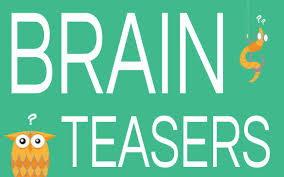Beyond the Conundrum: The Wonders of Brain Teasers
Discover the world of brain teasers—a fascinating realm of puzzles that have intrigued minds for centuries. This article explores their intriguing history, various types, and the multitude of benefits they offer to individuals of all ages. Engage with brain teasers to unlock your mental potential and enjoy the thrill of solving enigmatic puzzles.
Benefits of Brain Teasers.

Brain teasers, also known as puzzles or enigmas, are intellectual challenges or problems that require creative and critical thinking to solve. They are designed to test one's cognitive abilities, including logical reasoning, problem-solving skills, lateral thinking, and sometimes mathematical or linguistic prowess. Brain teasers often present a situation, question, or pattern that appears complex or confusing at first glance, encouraging individuals to find innovative and often non-obvious solutions through careful analysis and thought. These puzzles come in various forms, such as logic puzzles, mathematical puzzles, word puzzles, visual puzzles, and riddles, each challenging a different aspect of cognitive function. Engaging with brain teasers is not only entertaining but also serves to stimulate the mind, enhance mental agility, and improve analytical skills.
Brain teasers have been captivating the human mind for centuries, stimulating intellectual prowess and encouraging creative thinking. These perplexing puzzles come in various forms and challenge our cognitive abilities, pushing us to think outside the box and find innovative solutions.

Types of Brain Teasers
1. Riddles and Word Puzzles Riddles are verbal puzzles that require creative thinking to decipher the hidden meaning or answer. Word puzzles involve rearranging letters or solving linguistic challenges.
2. Logic Puzzles Logic puzzles require deductive reasoning and logical thinking to solve. They often involve arranging information and using clues to reach a valid conclusion.
3. Mathematical Puzzles These puzzles involve numerical operations and mathematical principles to arrive at a solution. Sudoku and arithmetic problems fall into this category.
4. Visual and Spatial Puzzles These puzzles challenge one's perception and spatial awareness. Optical illusions, mazes, and pattern recognition exercises fall into this category.
5. Lateral Thinking Puzzles Lateral thinking puzzles prompt individuals to think creatively and approach problems from unconventional angles, often resulting in surprising and unexpected solutions.
Tips for Tackling Brain Teasers
- Read Carefully: Pay close attention to the details and wording of the puzzle. Often, the solution lies in a specific phrasing or hidden clues.
- Practice Regularly: Like any skill, improving at solving brain teasers requires consistent practice. Engage with a variety of puzzles to broaden your thinking patterns.
- Stay Patient and Persistent: Some brain teasers can be challenging and may take time to solve. Patience and persistence are key attributes to develop while tackling them.
- Collaborate and Discuss: Sometimes discussing a brain teaser with others can offer fresh perspectives and lead to a breakthrough in solving the puzzle.
- Stay Open-Minded: Approach brain teasers with an open mind, ready to explore different possibilities and think creatively.

Benefits of Brain Teasers
Engaging with brain teasers offers a plethora of benefits:
- Mental Stimulation: Brain teasers provide mental exercise, keeping the brain active and engaged, thus enhancing cognitive abilities and memory retention.
- Problem-Solving Skills: They encourage critical thinking and help develop problem-solving skills, a valuable asset in both personal and professional life.
- Enhanced Focus and Concentration: Solving brain teasers demands concentration and attention to detail, which can improve focus and concentration levels.
- Stress Reduction: Engaging in brain teasers can serve as a relaxation technique, diverting the mind from stress and promoting a sense of enjoyment.
- Social Interaction: Brain teasers can be a fun group activity, fostering social interaction and teamwork while stimulating mental activity.



